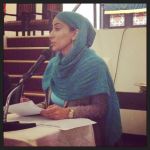I recently had the honor of serving on a panel entitled “Feminist Theology: Four Perspectives” with three of my faculty colleagues: Rosemary Radford Ruether, Monica A. Coleman, and Najeeba Syeed. It had been organized by the Claremont School of Theology Alumni/ae Association in partnership with the La Plaza United Methodist Church and the Los Angeles United Methodist Museum of Social Justice (where the event had taken place).
We had an incredible time. La Plaza UMC, led by CST alum Rev. Vilma Cruz-Baez (’07), graciously hosted a reception before our panel discussion. As we feasted on hearty Mexican food (my favorite was the watermelon agua fresca), we perused the Exodus exhibition in the Museum of Social Justice, which featured dramatic black and white photographs of migrants and others who had made their lives in Los Angeles (n.b., the Museum is located in the basement of the Church, which is itself located on historic Olvera Street). I was grateful for the warm welcome and short history of the Museum that Director Leonara Barron provided.
After further introductions and words of welcome, moderator Thea Mateu Zayas (CST ’14) cued us panelists to begin our presentations.
 Our esteemed colleague, Rosemary, went first. In her typically erudite manner, she explained what ecofeminism is, particularly to what exactly ecofeminism is serves as a corrective. I was especially grateful to hear her denounce any simplistic identifications between women and nature as well as tease out what ecofeminism implies for ethics and theology.
Our esteemed colleague, Rosemary, went first. In her typically erudite manner, she explained what ecofeminism is, particularly to what exactly ecofeminism is serves as a corrective. I was especially grateful to hear her denounce any simplistic identifications between women and nature as well as tease out what ecofeminism implies for ethics and theology.
Professor Monica A. Coleman went third. She spoke beautifully about the ways in which her entrance into religious studies
 had been shaped from the start by black women’s scholarship–the writings of Zora Neale Hurston, Alice Walker, Katie Geneva Cannon, Delores Williams, Renita Weems, and others. She then explained what “third wave womanism” is, the impetus behind her widely-anthologized “Must I Be a Womanist” article, and the many ways that she and others will continue to “wade in the water” by “troubling” conventional wisdom.
had been shaped from the start by black women’s scholarship–the writings of Zora Neale Hurston, Alice Walker, Katie Geneva Cannon, Delores Williams, Renita Weems, and others. She then explained what “third wave womanism” is, the impetus behind her widely-anthologized “Must I Be a Womanist” article, and the many ways that she and others will continue to “wade in the water” by “troubling” conventional wisdom.
 Our fourth panelist, Professor Najeeba Syeed, brought down the house! She opened with an original poem and then, with the commanding presence and passion of a scholar-activist-preacher, enumerated in eight different ways the difference that a critical feminist perspective can make to interreligious encounters or studies and transnational politics. I can’t possibly do justice to her many points (e.g., she encouraged the audience to consider who has access to sacred space, interrogated the supposed link between women’s liberation and particular expressions of public piety, delimited the ways in which feminism “busts up” traditional categories of analysis in religion), though one tweet I read later about her presentation captured what I suspect was a widespread reaction among the students in the audience: “Friend turns to me after @NajeebaSyeed finishes: ‘Holy shit.’ Me: ‘Yeah, she’s awesome.’ @CST_News feminist theology panel.”
Our fourth panelist, Professor Najeeba Syeed, brought down the house! She opened with an original poem and then, with the commanding presence and passion of a scholar-activist-preacher, enumerated in eight different ways the difference that a critical feminist perspective can make to interreligious encounters or studies and transnational politics. I can’t possibly do justice to her many points (e.g., she encouraged the audience to consider who has access to sacred space, interrogated the supposed link between women’s liberation and particular expressions of public piety, delimited the ways in which feminism “busts up” traditional categories of analysis in religion), though one tweet I read later about her presentation captured what I suspect was a widespread reaction among the students in the audience: “Friend turns to me after @NajeebaSyeed finishes: ‘Holy shit.’ Me: ‘Yeah, she’s awesome.’ @CST_News feminist theology panel.”
What about my remarks? I spoke second. I began by offering my understanding of feminism–one that I named as having been influenced by the work of Judith Butler, bell hooks, and Sister Margaret Farley (among others). I also stressed how the best feminist scholarship today is intersectional.
I next described how feminist theo-ethical commitments inform my current research projects. I spent most of the time talking about an anthology I am co-editing with Rebecca Todd Peters (“Toddie”) that is tentatively entitled Encountering the Sacred: A Theological Exploration of Women’s Lives. But I also took the opportunity to acknowledge how the work of Carol Adams and others had led me to develop scholarly and activist interests in nonhuman animals, given the parallel ways that women and nonhuman animals can be exploited and commodified under patriarchy.
I spent most of the time talking about an anthology I am co-editing with Rebecca Todd Peters (“Toddie”) that is tentatively entitled Encountering the Sacred: A Theological Exploration of Women’s Lives. But I also took the opportunity to acknowledge how the work of Carol Adams and others had led me to develop scholarly and activist interests in nonhuman animals, given the parallel ways that women and nonhuman animals can be exploited and commodified under patriarchy.
In the final segment of my talk, I spoke of the ways in which I remain in the debt of flesh-and-blood feminist theologians, particularly those I am fortunate enough to count as mentors, colleagues, and friends. I named fellow panelist Rosemary as a prime example, given her active support for the scholarship of emerging feminist theologians, such as by agreeing to co-edit an anthology with a former student and newly-minted PhD and writing the Forward to the book of another former student who had recently completed her MA degree. But I also named the ways in which leading Asian and Asian American feminist theologians and bible scholars have given tirelessly (in both time and money) to a small organization of which we are a part, PANAAWTM (Pacific, Asian, and North American Asian Women in Theology and Ministry), so that graduate students can continue to receive scholarships to attend our conferences.
I concluded by noting that while I continue to learn from senior feminist scholars, I am most influenced and supported on a day-to-day basis by my feminist colleagues who are peers and friends. I therein took the opportunity to name the many ways in which fellow panelists and close friends Monica, Najeeba, and I have helped one another navigate various professional and personal challenges.
The Q&A that followed was lively and soon it was time to leave. I remain grateful for all those who made the event possible, including the extended Claremont School of Theology community (the administration, faculty, staff, current students, and alumni/ae) who spent one September evening in a historic LA UMC church reflecting on the importance of feminist theology.
Grace Yia-Hei Kao is Associate Professor of Ethics and co-director of the Center for Sexuality, Gender, and Religion at Claremont School of Theology. She is the author of Grounding Human Rights in a Pluralist World (Georgetown University Press, 2011) and has a forthcoming co-edited anthology with Ilsup Ahn on Asian American Christian Ethics (Baylor University Press). Read more about her work on her website.
Discover more from Feminism and Religion
Subscribe to get the latest posts sent to your email.



Thank you for sharing this marvelous event, Grace. Wish I could have been there to listen and learn.
LikeLike
Thanks Barbara for your affirmation; it was indeed a great event!
LikeLike
Wish I could have been there. It sounds like it was a great gathering with great feminist speakers. Monica Coleman and RRR (my abbreviation for Rosemary Radford Ruether) as well as you, Grace, have all written blog posts here. But I don’t think that Najeeba Syeed has. Maybe you could ask her to write a post about the amazing talk she presented.
LikeLike
Nancy – thanks so much for writing. I’m sure you’re not the only one who’d want to see a transcript of Najeeba’s talk. Let me include some hyperlinks for you for past blogs of Najeeba’s that have appeared here on feminismandreligion.com: https://feminismandreligion.com/2012/06/29/storytelling-to-restore-the-sacred-in-our-lives-by-najeeba-syeed-miller/, https://feminismandreligion.com/2012/01/29/walking-in-the-footsteps-of-mary-by-najeeba-syeed-miller/, https://feminismandreligion.com/2012/06/03/the-crying-of-an-ant-finding-a-theory-of-change-by-najeeba-syeed-miller/, https://feminismandreligion.com/2011/09/28/hidden-spirituality-the-life-of-a-muslim-family-by-najeeba-syeed-miller/
LikeLike
Sounds like it was a great event. Was it recorded?
LikeLike
Val: to my knowledge, no, which is a bummer because a number of folks had asked. We’ll have to be sure to record events like these in the future!
LikeLike
Oh wow, that is a bummer. Well, I will continue to follow your blog. I found it through Carol Adams. :)
LikeLike
Val – wow, how did you find it through Carol Adams? I assume a word search? Here is a podcast of the event: https://m.soundcloud.com/claremonttheology/feminist-theology-four-perspectives?utm_source=soundcloud&utm_campaign=share&utm_medium=facebook
LikeLike
I too wish I had attended this event but I am concerned with your comment regarding Rosemarys speech, “I was especially grateful to hear her denounce any simplistic identifications between women and nature”? Since most women’s spirituality & archaeomythology research, art, writings, sites,etc., lean towards the connection between our “non-human” friends talents and the metaphors related to seasons as well as blood lines beginning with womens monthly mensus – it seems there is nothing simplistic about these identifications but conversely a complicated system of metaphors which led humans to language, education, science, philosophy, spirituality and the arts. I find the dismisal of these insights to be troubling. Jayne 4 http://www.womensheritageproject.ning.com
LikeLike
Jayne – thanks for writing and please let me clarify, as the spirit of what Rosemary said (and what I agreed with) is in line with what you wrote. There are many, many deep connections between women and nature (this is a core insight of ecofeminism); what Rosemary is arguing against is simplistic or facile connections, as in “so women are [automatically] closer to nature and thus are best positioned to ‘save it.’. Feel free to listen to the podcast of her remarks (she is first) here: https://m.soundcloud.com/claremonttheology/feminist-theology-four-perspectives?utm_source=soundcloud&utm_campaign=share&utm_medium=facebook
LikeLike
Good people: There is now a podcast of our panel that is available here: https://m.soundcloud.com/claremonttheology/feminist-theology-four-perspectives. And a “storify” of live tweets from the event + audio can be found here: https://storify.com/CST_News/feminist-theology-four-perspectives
LikeLike
Wow, thanks so much for sharing the link to the podcast of the event! So sorry I didn’t see your reply until now. In answer to your question on how I found out about your blog, I think she may have shared a link on her Facebook page. Hard to remember now, since that was back in September! :)
LikeLike